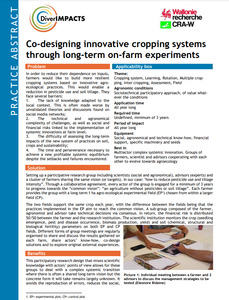{Tool} Co-designing innovative cropping systems through long-term on-farm experiments (DiverIMPACTS Practice Abstract). [Co-conception de systèmes de culture innovants par le biais d'expériences à long terme sur l'exploitation (DiverIMPACTS Practice Abstract).] Creator(s): Legein, Louise; Gyselynck, William and Jamar, Daniel. Issuing Organisation(s): CRA-W - Walloon Agricultural Research Centre. (2022)
|
PDF
- Published Version
- English
227kB | |
![[thumbnail of 2022-08-25 17_34_02-Protokoll.png]](/44406/2.hassmallThumbnailVersion/2022-08-25%2017_34_02-Protokoll.png)  Preview |
Image (PNG)
- Cover Image
- English
205kB |
Document available online at: https://zenodo.org/record/6488766#.YwePAnZByUk
Summary in the original language of the document
This participatory research design that mixes scientific knowledge with actors’ points of view allows for these groups to deal with a complex systemic transition where there is often a shared long-term vision but the concrete form it will take remains largely unknown. It avoids the reproduction of errors, reduces the social, technical and financial risks inherent to change and combines the acquisition of social, technical and scientific knowledge into a coherent corpus while fostering the adoption and propagation of innovation.
Summary translation
Ce design de recherche participative qui mêle les connaissances scientifiques aux points de vue des acteurs permet à ces groupes de faire face à une transition systémique complexe où il existe souvent une vision partagée à long terme mais dont la forme concrète reste largement inconnue. Il évite la reproduction des erreurs, réduit les risques sociaux, techniques et financiers inhérents au changement et combine l'acquisition de connaissances sociales, techniques et scientifiques en un corpus cohérent tout en favorisant l'adoption et la propagation de l'innovation.
| EPrint Type: | Practice tool |
|---|---|
| Teaser: | Mixing scientific knowledge with actors’ points of view for complex systemic transition. |
| What problem does the tool address?: | In order to reduce their dependence on inputs, farmers would like to build more resilient cropping systems based on innovative agroecological practices. This would enable a reduction in pesticide use and soil tillage. They face several barriers: 1. The lack of knowledge adapted to the local context. This is often made worse by unvalidated theories and discussions found on social media networks; 2. The technical and agronomical complexity of challenges, as well as social and financial risks linked to the implementation of systemic innovations at the farm level; 3. The difficulty of assessing the long-term impacts of the new system of practices on soil, crops and sustainability; 4. Time and perseverance are necessary to achieve a new profitable systemic equilibrium despite the setbacks and failures encountered. |
| What solution does the tool offer?: | Setting up a participative research group including scientists (social and agronomical), advisors (experts) and a cluster of farmers sharing the same vision (or targets). In our case: "how to reduce pesticide use and tillage intensity”. Through a collaborative agreement, every actor of the group is engaged for a minimum of 3 years to progress towards the “common vision”: “an agriculture without pesticides or soil tillage”. Each farmer provides the group with a long-term 1 ha agroecological experimental field (EP1) chosen from within a larger field (CP). The two fields support the same crop each year, with the difference between the fields being that the practices implemented in the EP aim to reach a common vision. A subgroup composed of the farmer, agronomist and advisor takes technical decisions via consensus. In return, the financial risk is distributed 50/50 between the farmer and the research institution. The scientific institution monitors the crop (seedling emergence, pest and disease occurrence, biomass production, yield) and soil (chemical, structural and biological fertility) parameters in both EP and CP fields. Different forms of group meetings are regularly organised to share and discuss the results gathered on each farm, share actors’ know-how, co-design solutions and explore original external experiences. |
| Country: | France |
| Type of Practice Tool: | Practice abstracts |
| Keywords: | experimental farms, long-term experiment, cropping systems |
| Agrovoc keywords: | Language Value URI English farm management http://aims.fao.org/aos/agrovoc/c_2799 English cropping systems http://aims.fao.org/aos/agrovoc/c_1971 |
| Subjects: | Knowledge management > Research methodology and philosophy > Systems research and participatory research |
| Research affiliation: | European Union > Horizon 2020 > Diverimpacts France > Other organizations France European Union > Organic Farm Knowledge |
| Horizon Europe or H2020 Grant Agreement Number: | 727482 |
| Related Links: | https://organic-farmknowledge.org/tool/44406, https://twitter.com/farm_knowledge/status/1612365688919756801, https://www.facebook.com/organicfarmknowledge/posts/pfbid02JxWNsatFWTuTJgWh9joHc5cTzx1v5iFX6VLD5cQ6MqWdKGe7fkWsMxcKHvBihFUNl |
| Project ID: | ofk |
| Deposited By: | Rüger, Madelaine Lea |
| ID Code: | 44406 |
| Deposited On: | 29 Aug 2022 15:49 |
| Last Modified: | 02 May 2024 10:32 |
| Document Language: | English |
| Status: | Published |
Repository Staff Only: item control page

 Download Statistics
Download Statistics Download Statistics
Download Statistics
